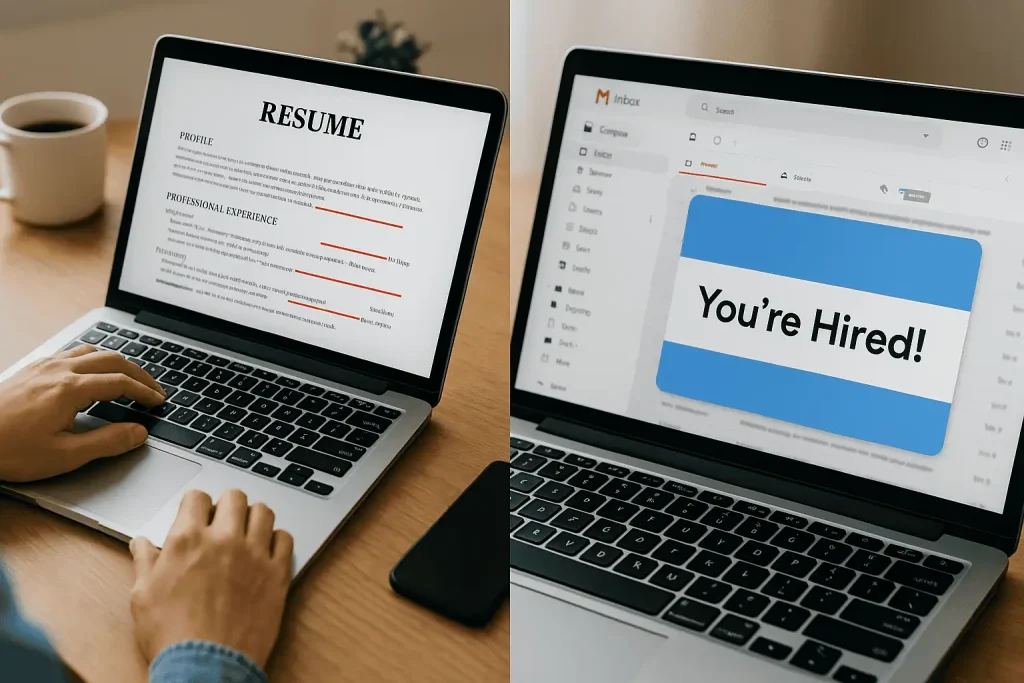The Exact Resume Tweaks That Get You Hired for Remote Jobs
Remote work is an awesome career option. Despite big businesses’ aversion to remote work, it’s clear that it’s here to stay.
But how do you get jobs offering remote work? Tailoring your resume for remote jobs is one way that helps you stand out from other job seekers. However, there’s more you can do!
This short guide shows you how to create a strong resume for remote jobs that hiring managers will notice.
Table of Contents
1. Understand What Employers Want in a Remote Worker
Know what companies look for before you update your resume.
Identify Remote-Specific Skills
Remote employers want people who can:
- Manage their time well
- Communicate clearly in writing and speaking
- Use tools like Slack, Zoom, and Trello with ease
- Solve problems on their own
Research the Role and Company
This is key! Don’t more forward until you do your research. Look at job listings for:
- Key skills and tasks
- Words that show company values like “flexibility,” “self-starting,” or “teamwork”
Show Your Remote Experience
Does your resume show you’re remote ready? Highlight your remote readiness by:
- Mentioning any remote or hybrid work you’ve done
- Showing times you worked on your own and met deadlines
2. Update Your Resume Format for Remote Work
How your resume looks matters as much as what it says. Don’t EVER hand in a poorly formatted resume, please!

Choose the Right Layout
The best format for remote work includes:
- Clean designs that read well on screens
- Clear headings and short bullet points
- Enough white space to make reading easy
- Avoid too many colors (2 is fine)
- Keep it easy to scan
Add a “Remote Work” Section (If You Have Experience)
If you’ve worked remotely before:
- Create a section called “Remote Work Experience”
- List remote jobs, tools you’ve used, and what you achieved
Make Key Details Clear in the Header
Show your remote status right away:
- Add “Open to Remote Work” at the end of your career summary
- List your location as “Based in [City], Remote” or “Remote Worker”
- Mark specific roles as remote by adding “(Remote)” next to a location listed for the previous employer
3. Use Keywords That Stand Out for Remote Jobs
Good keywords help your resume pass through hiring software (ATS Systems) and catch the eye of recruiters.

Use Words from the Job Posting
Look for and add terms like:
- “Remote team,” “online tools,” and “virtual meetings”
- Specific remote terms from the job listing
- Names of tools and software you know how to use
Use Strong Action Words
Add verbs that show:
- You can work on your own (like “managed,” “led,” “built”)
- You take action without being told
4. Highlight Remote Job Skills in Your Resume
Some skills matter more for remote work. This is the best place to make sure they stand out.
Core Remote Job Skills
Stress your ability to:
- Stay motivated and adapt to changes
- Think for yourself and fix problems
- Work well with people from different cultures
- Be reliable and hand in work on time
Tools To Showcase
Show you’re tech-ready and able to be self-sufficient by listing:
- Experience with tools like Zoom, Asana, or Teams
- Any relevant certifications you have (tech or program/project management)
- Comfort with digital tools that boost work output
You can also create a Technology Skills section on your resume and list more remote programs that you use there.
Add Numbers to Your Results
Metrics speak louder on resumes. And, they’re easier to scan.
But metrics alone have no meaning unless you use facts to back up what you’ve done:
- “Led 15 online meetings weekly, finishing projects 30% faster”
- “Helped 12 team members across 4 time zones”
- “Raised customer happiness by 25% while managing customer issues remotely”
5. Tailor Your Resume for Specific Remote Jobs
Tweak your resume for each job you apply for.

Customize Your Summary
Write a brief intro that:
- Shows your remote skills and experience
- Matches what the company needs now
- Example: “Customer service pro with 3 years helping clients remotely”
Adjust Your Work History
For each job you apply to:
- Match your past work to what they want (include keywords that are truly relevant)
- Put your most relevant jobs first
- Focus on tasks that relate to remote work
Include Skills from Other Jobs
Even if you haven’t worked remotely before, highlight:
- Skills from office jobs that work well remotely
- Times you solved problems or worked well on teams
- When you worked without much oversight
6. Write a Cover Letter for Remote Roles (Bonus Tip)
A good cover letter helps your resume stand out.

Mention Remote Work Skills
In your letter:
- Say why you’d do well in a remote job
- Give examples of how you’ve handled remote work challenges
- Describe your home office setup (only necessary if the hiring manager asks)
Show Your Interest in Remote Work
Make it clear that:
- You like the freedom and focus of remote work
- You’re excited about working with their company remotely
What’s Next?
Making a good remote job resume is simple. Focus on the right skills, choose a clean format, and use key terms from job listings. The best resume shows both your work skills and your ability to work from anywhere.
Start using these tips today to improve your resume for remote jobs and get the work-from-home job you want.


